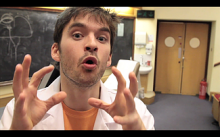How Your Brain Works In 3 Minutes
(Inside Science) -- What does your brain do best? It finds meaning in our chaotic world. It sifts the information coming in from your senses, from the touch senses in your fingertips to the taste senses in your tongue, to the fine inner ear hair cells that sense differences in pitch. And it tries to work out which of these are signals and which of these are just random noise. There is a constant river of data flooding into our brains all the time. It’s our brains’ job to make sense of this -- what has meaning, and what doesn’t.
As we grow up and have increasingly sophisticated brain regions, we gain increasing insight into our worlds. And with increasing insight, comes an increased chance of survival.
Take sight: The retina is searching for information as soon as light hits it -- it’s processing contrast, looking for edges in the noise. Those signals then move to the early visual cortex, which searches for shapes and movements in the scene.
And at the highest stages of visual processing our brains search for the most complex shapes we can recognize, like faces in the brain’s fusiform gyrus. From the simplest shapes, to the subtlest social moments, our brains are constantly trying to work out what things have meaning, and what things just don’t.
Even at a microscopic level, our brain cells are constantly either strengthening synapses that carry good information from other brain cells, or letting synapses that carry only noise … die.
This is called synaptic pruning and it’s happening all the time in our brains. And it’s the sum of all of these tiny decisions -- Is it noise? Is it not? -- that make up our interpretation of the world. And when we finally have an interpretation of the world that we trust, at last our brains can carry out their other major function -- controlling the actions of our bodies, from walking to talking to touching. But our actions will only ever be as good as our insight allows them to be.

